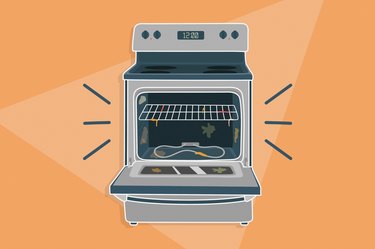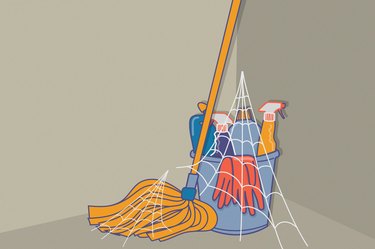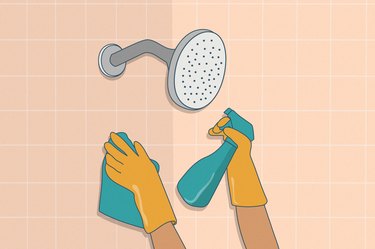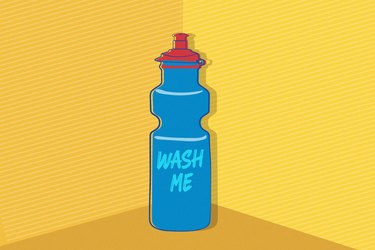
Between the heaping holiday dinners and hearty meals you prep for the week, your cooker is practically guaranteed to get sloppy this season. And if you're like many folks, scrubbing it down is not exactly top of mind.
About 47 percent of Americans can't remember the last time they cleaned their oven, according to a March 2019 survey from the National Cleaning Institute.
Video of the Day
So, what might go wrong if you put oven cleaning on the, ahem, back burner? Here's the dirt.
It’s a Fire Hazard
This is the most dangerous side effect of a dirty oven: "Oil is a fuel, so if you have spilled oil in the oven, it can serve as a fuel that can cause or enhance a fire," says Philip Tierno, PhD, clinical professor of microbiology and pathology at NYU Langone Health.
In fact, cooking is the leading cause of home fires and home fire injuries, resulting in an average of 172,900 fires per year, per a July 2020 study by the National Fire Protection Association. That said, compared to other home cooking appliances, ovens had the lowest rate of risk.
Your Kitchen Could Get Smoky
Put this in your pipe and smoke it: "As grease builds up in the oven, it gives rise to a smoky environment," Tierno says. It's never a great idea health-wise to inhale smoke, so if puffs escape from your oven when it's heating up, that's a red flag it's time to clean.
"Degrading oil and petroleum products can also combine with other material that may be in the oven, such as cleaning fluids like sodium hydroxide, potentially creating toxic fumes," Tierno says. "However, no studies have been done examining this and there have been no deleterious health reports, so it's not a significant factor."
Plus, your oven's ventilation system should help with some of the exhaust, especially if you have a range hood. "Venting is a safety feature built into modern ovens," Tierno says. "As heat builds up, there is an automatic vent that shoots the hot air up and then another vent that shunts it outside, depending on the structure of your home."
Related Reading
Your Food Might Not Taste Great
If the flavor of your meals has been off, a filthy oven might be to blame.
"If you are cooking a cake in an oven coated in greasy material, the taste would be affected," Tierno says. The fumes from lingering grease and bits of old food can permeate baked goods in particular and give them an unpleasant taste.
Here's the rule of thumb for most people: "Clean your oven at least once every three months — more often if you're using it daily."
What About Germs?
Phew, at least germs aren't a concern. "Bacteria do grow on a variety of particulates in the oven, but the heat of the oven will be sufficient to kill the majority of these microorganisms — and certainly those that are harmful," Tierno says.
"I would not worry about a germ event."
Pathogens multiply in food that's between 40 degrees F to 140 degrees F — and the lowest oven setting is typically higher than that, according to the Centers for Disease Control (CDC).
Still, it's always best practice to use a food thermometer when cooking meat to make sure it has reached a safe internal temperature, per the CDC.
The Best Way to Clean Your Oven
Keeping your oven ship-shape is a breeze because the majority of units actually clean themselves.
"Self-clean oven cycles work by heating the oven to much higher temperatures than it would usually go, which reduces any burnt food and grease to ash," says Henry Paterson, operations executive at Housekeep. "Once the cycle has finished and the oven has cooled down, you can simply wipe out the ash with a damp cloth." Voila!
Other ovens have a steam cleaning feature. "For these, you just need to place some water at the base of your oven and set the cycle," Paterson says. "As the oven heats up, the water will turn to steam, releasing residual food and grease from the sides and back of the oven."
Before using the self-clean feature, always consult the oven manual. "There may be steps you need to take to ensure that the process is safe, such as removing the racks from the oven, ventilating the space, and making sure that children aren't present," Paterson says.
Exposure to burning food waste during the self-clean cycle can release potentially harmful pollutants into the air that can cause nose and throat irritation, headaches, fatigue and nausea, according to the California Air Resources Board.
What if Your Oven Isn't Self-Cleaning?
“There are plenty of oven cleaning products available in the supermarket, but the chemicals they contain are powerful — read the instructions carefully and ensure that you don’t spill any of the solution on your floors or surfaces,” Paterson says.
“There are also a number of home cleaning hacks you can use, such as steaming an ovenproof bowl of water and lemon or using a mixture of baking soda and vinegar to cut through the grease.”
This Is How Often to Clean Your Oven
First, if you drip something, clean it up as soon as the oven has cooled down to prevent it from smoking the next time you turn it on.
"Wiping your oven with water and mild detergent should be fine for a minor spillage," Paterson says. "Doing this regularly will also help to increase the time between needing full, deep oven cleans."
It's also helpful to prevent messes in the first place. "Consider putting trays underneath baking dishes to catch any drippings," Tierno says.
As for how frequently to give your oven a thorough once-over: "It depends on how much you use it and how sloppy you are," Tierno says. If you dine out most of the time and are careful not to spill when you do cook, you might clean it just a couple of times a year. If you're an avid chef or tend to get messy in the kitchen, scouring it out every other month might be appropriate.
Here's the rule of thumb for most people: "Clean your oven at least once every three months — more often if you're using it daily," Paterson says. "Your oven manual usually contains information about how often you should use the self-clean cycle, too."
So, Is It Bad to Never Clean Your Oven?
"It's certainly not good to never clean your oven," Paterson says. "Not only can a dirty, smoky oven have potential hazards, it's also just unpleasant."
Still, unless there's visible smoke, it's honestly not that bad.
- National Fire Protection Association: "Home Cooking Fires"
- CDC: "Four Steps to Food Safety: Clean, Separate, Cook, Chill"
- California Air Resources Board: "Indoor Air Pollution from Cooking"
- National Cleaning Institute: "2019 National Cleaning Survey: Why More Households Will Spring Clean This Year Than Any Other"



